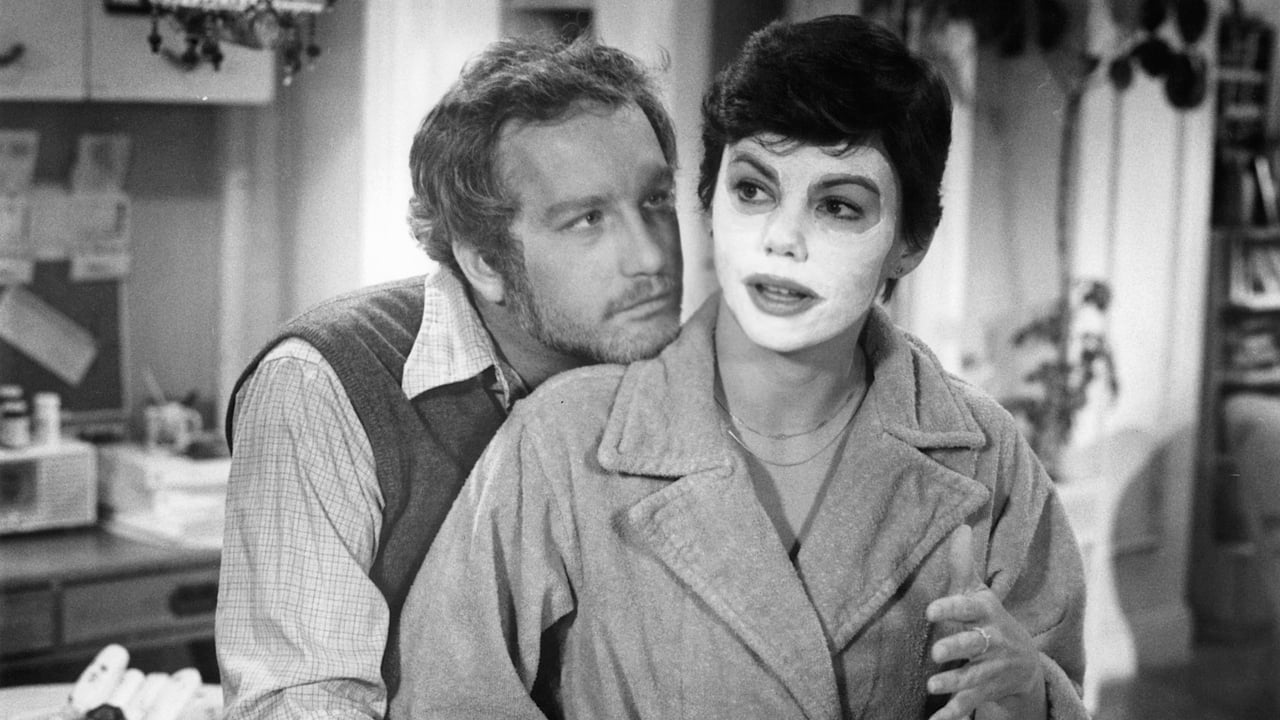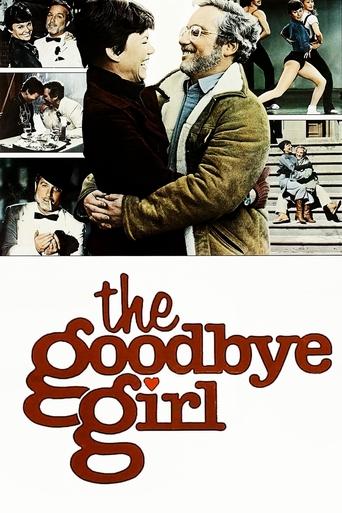

After being dumped by her live-in boyfriend, an unemployed dancer (Marsha Mason) and her 10-year-old daughter are reluctantly forced to live with a struggling off-Broadway actor (Richard Dreyfuss).This is Richard Dreyfuss at perhaps his most offbeat. Sure, Marsha Mason plays the lead and the film is called "the goodbye girl", but I think the movie passes or fails with Dreyfuss. For me, it passes, as he is strangely interesting and fun to watch.The film as a whole is not that amazing. It seems to have secured a few Oscar nominations but few wins. Today (2016), it is not one that most people have heard of. Heck, even Mason is not a household name. Worth a look, but not essential.
... View MoreA Neil Simon's romantic comedy helmed by Herbert Ross, stars his wife of that time, Marsha Mason, who would continue to lead three more pictures based on Simon's script, and among those four pictures, Mason acquires three Oscar nominations out of them (including this one, CHAPTER TWO 1979 and ONLY WHEN I LAUGH 1981), but more significant is that it won BEST LEADING ACTOR for Richard Dreyfuss, once the youngest winner at the age of 30 until Adrien Brody would unseat him in THE PIANIST (2002, 9/10). Paula McFadden (Mason) is a former dancer, she and her ten-year-old daughter Lucy (Cummings) are living with his actor boyfriend, one day, she returns to her apartment and out of the blue, finds out that she is dumped through a letter, her boyfriend deserts them because he has nailed a film contract, and what is worse, before leaving he sublets the apartment to one of his fellow actor Elliot Garfield (Dreyfuss), after an unpleasant first acquaintance, they merely agree to temporally live under the same roof. But Paula's world has been torn apart, being 32, she is obviously too old to compete in her old vocation, which is quite a grating prejudice of ageism, Elliot is a budding thespian, just being offer a chance play Richard III in an off-off-Broadway production, yet the requirement from the director of playing his role as "the queen who wants to be king", a stereotyped homosexual style boggles him.However, the from-foe-to-lover plot (which has become a corny norm in the genre now) of Paula and Elliot has been played out magnificently thanks to Simon's witty script with utterly delectable bickers, and the two leads shape a dynamic duo since Paula is juggling her insecure temperament of whether or not she should "trust the man" with her inherent attribute of a sucker for romance, whereas for Elliot, his feelings for her is prone to be a love-at-first-sight type, with a patina of verbal negation. Simon does prove that he has a keen eye to man-woman relationship, both sex carry an equal weight during the process and the equilibrium is maintained beautifully until the romance breaks out, not creative but essentially moving. Dreyfuss impresses with his top-notch elocution and genial spirit, leans on a more natural impulse other than rehearsed theatrics to be credible and engaging, also he looks rather older than his real-age, his Oscar victory would be very difficult to repeat now since Academy has shied away from awarding "good-natured" type of excellency decades ago, Elliot basically is a nice young man who has barely any bone to pick with, he is a bit finicky but never aggravates into the dark side. So does Mason, who possesses an obliging quality and her emotional turbulence is the main allure of the film, she is spontaneously approachable and compassion-arousing, which also functions as a magnet when the same scenario occurs to Elliot, we have no doubt what will happen, but it is Mason's heartfelt investment pulls off the feel-good ending and leaves us not grudge how lame it is. Also Quinn Cummings is nominated for an Oscar, the levelheaded but sensible daughter is always the catalyst between two adults, she is adorable and never a spoiled nuisance unlike nowadays her equivalents in the same breed. After all, THE GOODBYE GIRL is a much well-intentioned and well-executed comedy than another Ross-Simon production California SUITE (1978, 5/10), definitely a crowd- pleaser.
... View MorePaula McFadden (Marsha Mason) is a 33 year old ex-dancer single mother to 10 year old Lucy (Quinn Cummings) living in NYC. Her married actor boyfriend has moved to Spain/Italy for a movie instead of moving out to L.A. with them for a TV show. He sublets his apartment to another actor Elliot Garfield (Richard Dreyfuss). The girls are essentially kicked to the streets except Paula refuses to leave. A truce is declared with everybody trying to live together.This is a funny rom-com written by Neil Simon. The kid is adorable. Marsha Mason is the sarcastic bitter momma bear. There are some good exchanges with Dreyfuss who is terrific in this. The writing is sharp and funny. The chemistry does take awhile because Paula is so hostile for much of the movie. The lines come so fast that one can get overwhelmed.
... View MoreI can't help but channel another favorite film of mine, "Star Wars" as I compare the outrageous but more comported and more intelligent film of yesteryear to today's offerings. A film made for adults, about adults, acting like adults, with adult problems, and solving them like adults might, and did before the market reshift of the 80s and 90s to a pure teenage audience (or audience with teenage taste)."The Goodbye Girl" is the kind of film I like to see and watch. It's a more comported film about people behaving like mature adults, without succumbing to the urge to be a child with raging hormones. But the theatre of the 70s was a different animal than today's teenage market model.Neil Simon's play, translated to the screen, is full of wit and verve. It is funny without condescending to body functions, nor explicit sex for the sake of shock (which has lost its shock altogether). We're seeing the courting of a couple, both of whom are fighting to hold onto their dreams and stay in the world they know and love without succumbing to defeat.Challenges are made and met, mostly from the couple that fight, vie and come to a state of détente and acceptance. Both Dreyfus and Mason are high energy and outrageous without being stupid and insulting (again, unlike so many of today's contemporary films). Watching this film I'm reminded of the adults that used to pervade society on all levels. I can also feel, see, sense and smell the set of the small apartment in New York; the art direction and lighting design are that good. Throw in some very competent actors, and you got yourself one great photplay waiting to be shown. I used to hate and bemoan the 70s, but this film reminded me that those years weren't so bad. If I had a critique of the film, it's Simon's writing style. It's full of more wit than I think most people can readily absorb. He's almost too funny at times. It's the kind of thing that's both his trademark and his bane. Referencing a non-sexual double entente and political ongoings of the era were zestful. It was an age when information was more filtered, though prevalent, yet delivered at a wiser pace to allow for mental digestion. But Simon bucks the trend of the time by delivering wit fast and furious. It was, and still is, considered great art and genius. Though at times it can be silly.An actor and a former hoofer with a daughter? Can it work? Well, you probably know the answer to that one, but it's the journey that's the actual joy. An old fashioned film for an old fashioned time, when technology, though present, didn't pigeon hole personality types into discreet demographics. In short, this film is made for most everyone.Ah, and I haven't given one of these in a while, there are a couple of marginally racy scenes. After all, it is a PG film, and I would urge the parent or would be parent who's interested in watching this with their children, to pre-screen it first, and then decide.Again, overall an inviting film with some funny, witty and tender scenes. It's also marginally cliché in a Neil Simon kind of way, but it's what you expect, and you love the man for it.A decent watch.
... View More